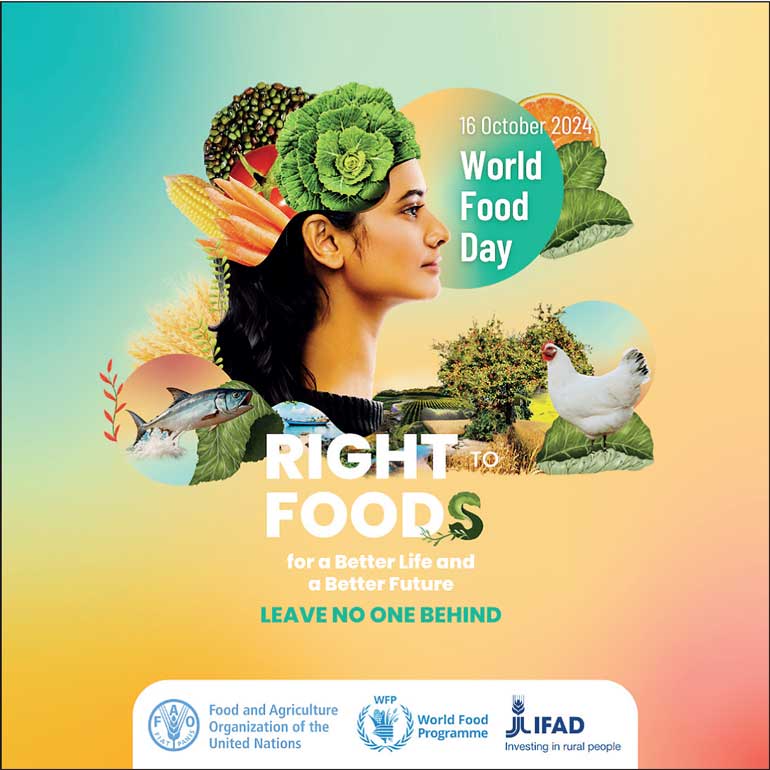Monday Feb 23, 2026
Monday Feb 23, 2026
Wednesday, 16 October 2024 00:22 - - {{hitsCtrl.values.hits}}

|
 This World Food Day, we come together to emphasise the crucial need for collective action to realise the “Right to Foods”—not just as an aspiration but as a tangible reality for every Sri Lankan and every citizen of the world. Under the theme “Right to Foods for a Better Life and a Better Future,” we are reminded that while global agricultural production may yield enough calories, millions still struggle with hunger, malnutrition, and food insecurity. Approximately 2.8 billion people worldwide cannot afford a healthy diet, contributing to all forms of malnutrition, from undernourishment to rising rates of overweight and obesity.
This World Food Day, we come together to emphasise the crucial need for collective action to realise the “Right to Foods”—not just as an aspiration but as a tangible reality for every Sri Lankan and every citizen of the world. Under the theme “Right to Foods for a Better Life and a Better Future,” we are reminded that while global agricultural production may yield enough calories, millions still struggle with hunger, malnutrition, and food insecurity. Approximately 2.8 billion people worldwide cannot afford a healthy diet, contributing to all forms of malnutrition, from undernourishment to rising rates of overweight and obesity.
Here in Sri Lanka, the challenges are multifaceted. Natural disasters, economic downturns, and global shocks have intensified food insecurity, disproportionately affecting the most vulnerable populations—especially women, children, rural communities and persons with disabilities. We can choose to ignore this only at our own peril.
The right to food extends beyond mere survival – it is about accessing a diverse, nutritious, and affordable diet that allows people to lead healthy, fulfilling lives. Achieving this right requires transformative changes in our agrifood systems. These systems must be efficient, inclusive, resilient, and sustainable. Moreover, they should respect our traditional food cultures while embracing science-based solutions and technology.
As the Food and Agriculture Organization of the United Nations (FAO), the International Fund for Agricultural Development (IFAD), and the World Food Programme (WFP), and our collective work in Sri Lanka focuses on ensuring food availability, accessibility, and affordability. FAO’s multiple initiatives, including the “One Country One Priority Product” program, as well as climate-smart agriculture techniques under “GAP” and sustainable production enhancements through “RiceUp” and “RiceRethink” projects, are critical to these efforts.
Meanwhile, WFP’s ‘Home Grown School Feeding’ strengthens the sustainability of the national school meal program while its ‘ADAPT4R’ program helps farming communities adapt to climate change, and IFAD’s investments are not only helping rural women and men eat healthier by encouraging a diversified diet, they are also helping rural communities increase their incomes by enhancing productivity and improving market connections, thereby, increasing their ability to purchase nutritious food.
While the role of UN agencies is important, the leadership of the government, along with the effective participation of NGOs, the private sector, and academia and research institutions, is vital for success in this endeavour. Governments must integrate the right to food across their policies, ensuring equitable access to resources like land, water, and fisheries while fostering inclusive decision-making that involves local communities, women, indigenous peoples, and youth. Private sector actors need to be accountable, supporting sustainable agriculture and making nutritious, diverse foods more affordable and accessible.
Academia and research institutions have the responsibility to generate evidence to inform policy making and bring innovative practices to fore. Consumers, too, must make informed choices by reducing food waste and creating demand for nutritious food to help elevate it as a priority.
Now, more than ever, we must unite to build agrifood systems that leave no one behind. It is time to turn words into action—transforming Sri Lanka’s agrifood systems to meet the needs of today and ensure a brighter, food-secure future for tomorrow. Together, we can help Sri Lanka and the world realize the Four Betters: better production, better nutrition, a better environment, and a better life for all.
As we commemorate World Food Day, let us pledge to take meaningful actions that promote the right to food for all. This involves advocating for policies that support food sovereignty, investing in local agriculture, and ensuring that marginalised voices are heard in discussions about food systems. It also means holding ourselves accountable as consumers to make choices that align with our values.
Let us act now to honour everyone’s right to nutritious and diverse foods, recognising that our collective future depends on it.
(Vimlendra Sharan is the FAO Representative for Sri Lanka and the Maldives. Abdur Rahim Siddiqui is the Representative and Country Director for the World Food Programme in Sri Lanka. Sherina Tabassum is the IFAD Country Director for Sri Lanka and the Maldives.)